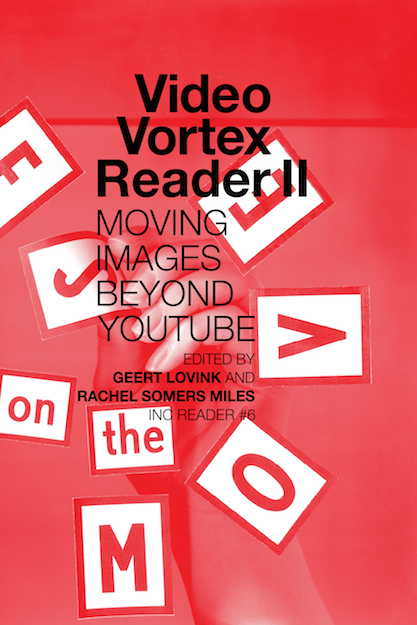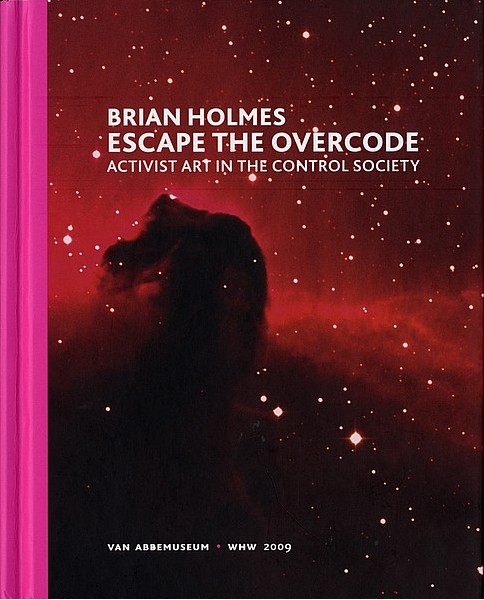Geert Lovink, Rachel Somers Miles (eds.): Video Vortex Reader II: Moving Images Beyond YouTube (2011)
Filed under book | Tags: · aesthetics, human rights, internet, media activism, network culture, online video, politics, theory, video, video art, youtube

“Video Vortex Reader II is the Institute of Network Cultures’ second collection of texts that critically explore the rapidly changing landscape of online video and its use. With the success of YouTube (’2 billion views per day’) and the rise of other online video sharing platforms, the moving image has become expansively more popular on the Web, significantly contributing to the culture and ecology of the internet and our everyday lives. In response, the Video Vortex project continues to examine critical issues that are emerging around the production and distribution of online video content.
Following the success of the mailing list, the website and first Video Vortex Reader in 2008, recent Video Vortex conferences in Ankara (October 2008), Split (May 2009) and Brussels (November 2009) have sparked a number of new insights, debates and conversations regarding the politics, aesthetics, and artistic possibilities of online video. Through contributions from scholars, artists, activists and many more, Video Vortex Reader II asks what is occurring within and beyond the bounds of Google’s YouTube? How are the possibilities of online video, from the accessibility of reusable content to the internet as a distribution channel, being distinctly shaped by the increasing diversity of users taking part in creating and sharing moving images over the web?”
Contributors: Perry Bard, Natalie Bookchin, Vito Campanelli, Andrew Clay, Alexandra Crosby, Alejandro Duque, Sandra Fauconnier, Albert Figurt, Sam Gregory, Cecilia Guida, Stefan Heidenreich, Larissa Hjorth, Mél Hogan, Nuraini Juliastuti, Sarah Késenne, Elizabeth Losh, Geert Lovink, Andrew Lowenthal, Rosa Menkman, Gabriel Menotti, Rachel Somers Miles, Andrew Gryf Paterson, Teague Schneiter, Jan Simons, Evelin Stermitz, Blake Stimson, David Teh, Ferdiansyah Thajib, Andreas Treske, Robrecht Vanderbeeken, Linda Wallace, Brian Willems, Matthew Williamson, Tara Zepel.
Publisher Institute of Network Cultures, Amsterdam, 2011
Creative Commons Attribution Noncommercial No Derivative Works 3.0 Netherlands License
ISBN 9789078146124
378 pages
PDF, PDF (updated on 2017-4-11)
Comment (0)Franco “Bifo” Berardi: The Soul At Work. From Alienation to Autonomy (2009)
Filed under book | Tags: · alienation, autonomy, capitalism, labour, philosophy, politics, simulation, theory

“Capital has managed to overcome the dualism of body and soul by establishing a workforce in which everything we mean by the Soul—language, creativity, affects—is mobilized for its own benefit. Industrial production put to work bodies, muscles, and arms. Now, in the sphere of digital technology and cyberculture, exploitation involves the mind, language, and emotions in order to generate value—while our bodies disappear in front of our computer screens.
In this, his newest book, Franco “Bifo” Berardi—key member of the Italian Autonomist movement and a close associate of Félix Guattari—addresses these new forms of estrangement. In the philosophical landscape of the 1960s and 1970s, the Hegelian concept of alienation was used to define the harnessing of subjectivity. The estrangement of workers from their labor, the feeling of alienation they experienced, and their refusal to submit to it became the bases for a human community that remained autonomous from capital. But today a new condition of alienation has taken root in which workers commonly and voluntarily work overtime, the population is tethered to cell phones and Blackberries, debt has become a postmodern form of slavery, and antidepressants are commonly used to meet the unending pressure of production. As a result, the conditions for community have run aground and new philosophical categories are needed. The Soul at Work is a clarion call for a new collective effort to reclaim happiness.
The Soul at Work is Bifo’s long overdue introduction to English-speaking readers. This Semiotext(e) edition is also the book’s first appearance in any language.”
Preface by Jason Smith
Translated by Francesca Cadel, Giuseppina Mecchia
Publisher Semiotext(e), 2009
Foreign Agents series
ISBN 1584350768, 9781584350767
229 pages
Reviews: Michael Goddard (Mute, 2009), Lukas Keefer (Metapsychology, 2011), McKenzie Wark (Public Seminar, 2015).
PDF (thanks to esco_bar, updated on 2017-6-26)
Comments (2)Brian Holmes: Escape the Overcode: Activist Art in the Control Society (2009)
Filed under book | Tags: · activism, art, capitalism, critique, cybernetics, geopoetics, geopolitics, mapping, media activism, network culture, politics, social movements, theory

“This publication contains a selection of texts and essays by the writer Brian Holmes that engage with the possibilities and problematics of geopolitics and geopoetics. Holmes is a crucial contemporary writer and thinker whose insight into current social and political developments and how they relate to artistic processes opens up a new field of “geocritique”.
The examples he cites extend across Latin America, Europe and Asia, where he looks at networks, artworks, films, institutions and protest movements for signs of how future progressive strategies might be shaped. The texts here are connected in part with the long-term collaborative research project Continental Drift.”
Publisher Van Abbemuseum, Eindhoven, and Zagreb: WHW, 2009
Research Series, 2
ISBN: 9789070149987
414 pages
HTML
PDF’d HTML (updated on 2015-4-28)

